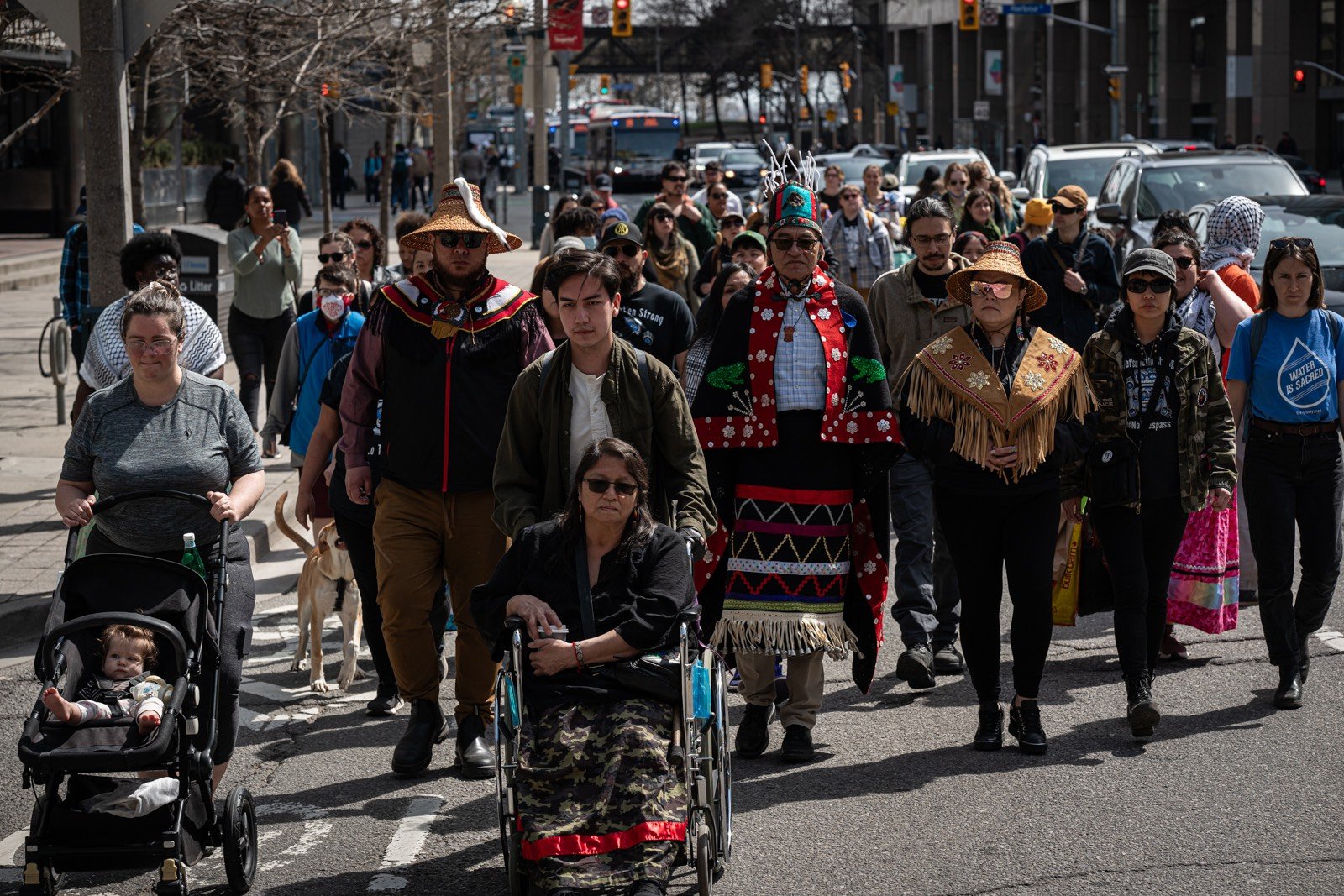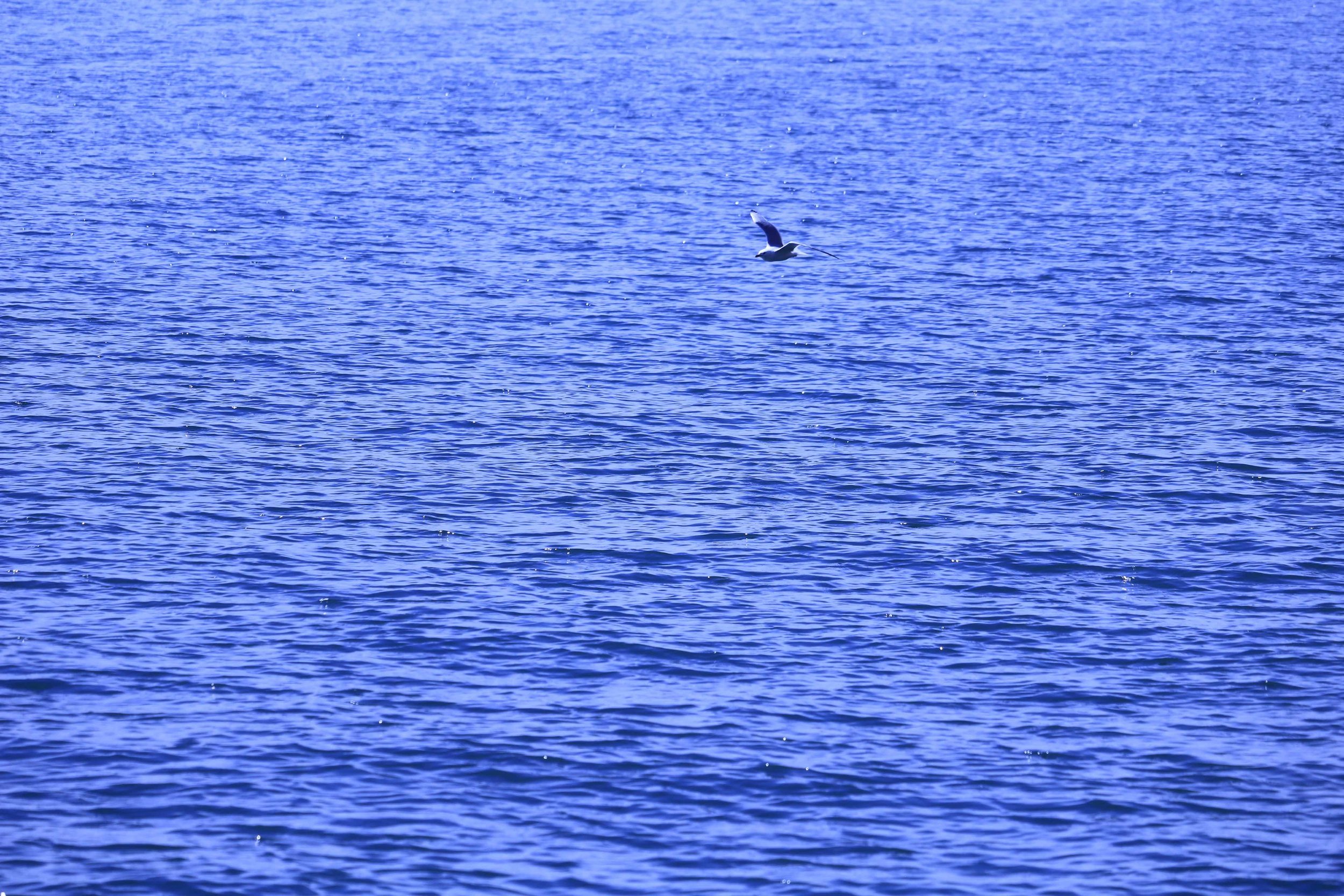RBC’s 2024 AGM: Building Collective Momentum & Taking Back the Narrative
From April 8 - 13, members of Indigenous Climate Action’s team led and participated in powerful events, focused on the 2024 Royal Bank of Canada’s (RBC) Annual General Meeting (AGM). This collaborative work, part of a larger coalition of Divestment work, hosted over thirty delegates from front line communities across Turtle Island to speak directly to the violations of Indigenous rights that RBC continues to finance. This gathering of Nations across colonial borders began with ceremony in Tkaronto, the traditional territory of the Mississaugas of the Credit, the Anishnabeg, the Chippewa, the Haudenosaunee, and the Wendat peoples.
Our continued solidarity and efforts to build nation-to-nation kinship is deeply rooted in decolonial practices to urge collective self-determination (Free, Prior and Informed Consent), in efforts of uplift recognition and sovereignty of Indigenous economy. RBC continues to be one of the top fossil financiers in the world and so-called Canada’s number one bank for financing the fossil fuel industry. There is one thing we need to make clear: the climate crisis is not only being regulated in the favour of the fossil fuel industry by so-called Canada, but RBC’s so-called “incredibly successful project” (the Coastal Gaslink Pipeline) is only possible through the violation of Indigenous rights by intimidation and violent acts of the removal of Indigenous land defenders, meanwhile calling it reconciliation.
Building Collective Momentum
Art Is Power
From April 9-10, at GreenPeace Canada and Environmental Defence’s Tkaronto space, our team facilitated an art build with local organizers, artists and youth in preparation for a rally in solidarity outside RBC’s AGM. The finished pieces as well as the process of creativity amongst this crew was incredibly inspiring, showcasing the power of youth minds when united to envision and build meaningful momentum together.
What We’re Fighting For:
Water
On April 10, the ICA team along with Free Grassy Narrows, hosted a Water Ceremony for Indigenous delegates attending RBC’s AGM, as well as the general public, to take part in before marching the streets together in one of so-called Canada’s major financial districts. The route for the walk concluded at the venue for the Canadian Association of Petroleum Producers Symposium (CAPP) Conference taking place at the St. Regis Hotel, where we ended with speeches and songs.
From April 8 - 20, a United Nations Special Rapporteur, specializing in human rights to safe drinking water and sanitation, visited so-called Canada to assess efforts to implement the human rights to water and sanitation. During this visit, he found 'flagrant breaches' by the government around Indigenous communities rights to clean water.
Indigenous peoples know all too well that our territories have historically been used as sacrifice zones, the fossil fuel industry both indirectly and directly impacting our communities, continuing the erasure and ongoing genocide of our people. With this, it was important to ground ourselves in ceremony with the water along lake Ontario. The ceremony was led by Anishinaabeg community elder, Judy DaSilva, from Grassy Narrows—a community that has been a symbol of resilience, holding government accountable for mercury poisoning, and maintaining the longest blockade in so-called Canada to reclaim land from mining industries infringing on the Anishinaabeg inherent land rights.
Grounding our work in ceremony acts as a reminder to ourselves, and others of our original instructions as Indigenous Peoples to be stewards of Mother Earth, as well as honour the sacredness and life sustaining gifts water has offered us since time immemorial.
Taking Back the Narrative: Amplifying Our Concerns
During the AGM on April 11, Indigenous delegates attended the shareholder meeting to highlight the major health and human rights concerns posed by RBC financed projects within their communities. During the meeting’s question and answer period, delegates were allowed a maximum of one minute speaking time to address RBC’s CEO, Dave McKay, on the bank’s role in fuelling the climate crisis and continued violation of Indigenous rights—their mics cut off if they exceeded the time. This was an attempt by RBC to censor our voices and concerns by literally silencing us. For the last two years, RBC has either abruptly cancelled their in-person AGM without acceptable notice to Indigenous delegates, or segregated them into separate rooms.
We know our collective efforts are growing everyday, and RBC is feeling the pressure. Outside the shareholder meeting, on a rain-soaked, work-day Thursday morning, a crowd of hundreds marched to the AGM venue, the Toronto Congress Centre, where we were met with private security and a barricade with heavy police presence lining the entrance to the lot. Despite this, we rallied in solidarity with those inside the shareholder meeting (a highly bureaucratic and colonial setting) with singing, drumming, and speeches from organizers and community members.
Indigenous Climate Action held a press conference for delegates following the AGM, including Chief Na’Moks, Grand Chief Stewart Phillip, Celine Isimbi, Sharon Lavigne, Crystal Cavalier-Keck, Vanessa Gray, and Richard Brooks. Understanding RBC’s attempts to silence our concerns, we know it is important to create our own platforms to ensure our voices are heard and continue reclaiming our narrative that continues to be greenwashed.
The Financial Risk of Ignoring Rights
On March 7, RBC launched a new component to its Environmental and Social Risk process in response to shareholder resolutions filed by the B.C. General Employees’ Union (BCGEU), with support from the Union of BC Indian Chiefs (UBCIC), that evaluates impacts on Indigenous lands and communities.
In the lead up to the shareholder meeting, a number of distributed actions demonstrated a collective demand for an end to fossil fuel financing and Indigenous rights violations. This included Fossil Fools Day, made up of a digital day of action (April 1), and the support of over 40 Fossil Fools Day actions held at RBC branches (April 6) across Turtle Island.
“RBC is not off the hook by any means. Policies are one thing but what matters is action. We will closely monitor RBC’s progress. Respecting FPIC is not an optional standard that only applies when consent is granted. It must also include the right to say ‘no’ and have that respected.”
Chief Stewart Phillip, Union of BC Indian Chiefs
It is clear that there is both a need and desire for Indigenous-rights based frameworks and stronger FPIC policies across the banking sector as a whole. Our inherent and legal rights as Indigenous Peoples are foundations for real material risks and threats to extractive industries—in particular the fossil fuel industry. By keeping major banks invested in projects that violate the rights of Indigenous Peoples and worsen the climate crisis on the world stage through accessible education and amplification—we embolden allies, followers, and supporters to advance the transfer of money out of these banks.
Keep Up the Pressure!
Support Indigenous-led land defense, action, and capacity building!
Sign & Share: LeadNow’s petition to End C-IRG / CRU-BC Violence Against Land Defenders
Watch: Decolonial Solidarity Call to Action Webinar to learn more about the global movement for Divestment and standing in solidarity with Indigenous Peoples (Hosted March 10, 2024)
Register: Register for our next intake of the Climate Leadership Program (Virtual) Cohort 8 (June 7 - 9, 2024)!
Learn more about Indigenous Divestment, RBC’s harmful financial practices, and begin divesting!
Read:
GreenPeace’s Report on RBC’s climate commitments (Released March 20, 2024)
Environmental Defense’s Resource to learn more about so-called Canada’s Fossil Fuel Financing
Divest:
Learn more about how to divest through World Beyond War’s “Break Up with Your Bank” resources
Find banking alternatives through Bank on Better Future’s Resources
About the Authors
Vanessa Gray (she/her) is a queer Anishinaabe Kwe from the Aamjiwnaang First Nation. She is a water protector, environmental researcher, and community organizer for the Great Lakes region. Vanessa is a respected land defender emphasizing Indigenous peoples inherent and legal rights and sovereignty within climate justice. She continues to take part in a diversity of strategies, including calls on Concordia University to divest from fossil fuels, co-hosting Toxic Tours, and direct actions in solidarity with land defenders on Wet'suwet'en territory who continue to oppose the Coastal Gas Pipeline.
As a researcher, Vanessa is well known for her environmental justice work on pollution in Ontario’s Chemical Valley – a petrochemical hub on her territory and surrounding her community of Aamjiwnaang First Nation. She is the co-founder of Aamjiwnaang and Sarnia Against Pipelines (ASAP), Porcupine Warriors, and co-lead of the Environmental Data Justice (EDJ) Lab, which produces tools to visualize the relationship between colonialism, data, and pollution such as the Pollution Reporter App. Aamjiwnaang community member’s constant exposure to harmful emissions results in some of the highest mortality rates for cancers and respiratory diseases in Ontario. Vanessa has dedicated her life to challenging colonial violence and its impacts on environmental health.
Katie Wilson (she/they/he) is a queer, Indigenous (Cree, Saulteaux) aunty born and raised in Treaty Four Territory (Regina, SK) where they currently reside. The intention in her work is to uplift voices, conversations, and strategies that foster an equitable community—prioritizing climate justice, Indigenous sovereignty, 2SLGBTQ+ rights, accessibility, and the overall intersectionality of these movements. By utilizing her work and life she hopes to inspire future generations by embodying a commitment to art, education, community, and intergenerational healing.












